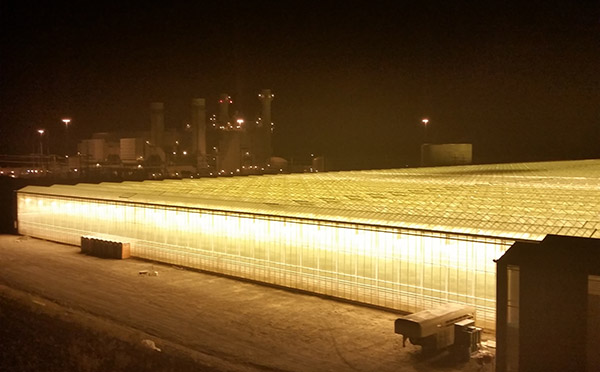Originally published in Issue 11, Oct. 2015
Houweling’s Tomatoes’ new 28-acre greenhouse operation in Mona, Utah, is using waste heat and carbon dioxide from a nearby power plant to sustainably produce tomatoes year-round.
During the second week of February this year Houweling’s Tomatoes began harvesting tomatoes at its new 28-acre greenhouse facility in Mona, Utah. This is the first of four phases to be constructed at the site, which includes 5 acres of packing house. The facility employs around 160 people.
Houweling’s is promoting its “Utah Grown” tomatoes, which include tomatoes on the vine, heritage beefsteak, grape tomatoes, cocktail and roma tomatoes. Located 75 miles south of Salt Lake City, 95 percent of the tomatoes are sold within the state with some being shipped to Florida and California. Its main customers include Smith’s, Costco, Albertsons, Sam’s and Walmart.

Using waste carbon dioxide, heat
The family-owned company also has production facilities in Camarillo, Calif., and its headquarters in Delta, British Columbia. What makes the Utah facility unique from Houweling’s other two operations is it’s built adjacent to an electrical power plant. Through patent-pending technology, the company will extract waste heat and carbon dioxide from the power plant’s exhaust stacks, which will be used to grow tomatoes year round.
“Our greenhouses are about 50 meters from the Rocky Mountain Currant Creek power plant,” said head grower Jose “Pepe” Calderon. “We will capture carbon dioxide generated by the power plant and use it to promote plant growth. Using the waste carbon dioxide, which is a required input for plant growth, is the essence of sustainability.”
The greenhouses also capture thermal energy generated by the natural gas burning power plant. The temperature of the flue gases is approximately 210ºF. The connection for collecting the waste heat will be completed in November. The greenhouse facility has been equipped with boilers that burn propane gas. The boilers will be used as a back-up heat source once the flue gas connection is completed. Calderon said it was most cost effective for the company to burn propane in it is boilers. A heating system has also been installed in the roof to melt snow, which is collected and stored for irrigation.

– Jose “Pepe” Calderon, Head Grower, Houweling’s Tomatoes
Continuous production
Houweling’s patented Ultra Clima semi-closed greenhouses have also been equipped with 13,500 high pressure sodium lamps that generate 17,000 lux. The lamps are used to provide 12-16 hours of supplemental light as needed.
[adrotate banner=”23″]
“We start to use the lights in September,” Calderon said. “When we plant a new crop we turn on the lights to enable the plants to get a strong start. At times during the summer when the light levels are over 1,100 watts, we shade the plants because certain varieties are weakened by too much light and can affect fruit quality.”

Coco coir grow bags is the substrate used in all three of the Houweling’s tomato operations.
Plants are watered with drip irrigation tubes. The recirculated water is filtered, heat sterilized and treated with chlorine dioxide to ensure all disease pathogens and biofilm are eliminated from the drain water and ready to reuse.
“In order to have continuous year-round production we interplant the plants,” Calderon said.
“While the old crop is still in production, toward the end of its production lifecycle, we plant a new crop. Timed right, this allows us to start picking the new crop right after we finish picking the old crop.”

Calderon said an advantage to growing the tomatoes in Utah is the cold winter helps to break the life cycle of insect pests.
“We have some pressure from whitefly,” he said. “We use the biological controls, including Encarsia and Eretmocerus predatory wasps. We introduce the wasps and other predators every week. We also maintain banker plants at the edge of each plant row to provide a habitat for the predators.
“We have been successful in using only biological controls so far. The use of biologicals continues to advance and is an area of focus for our IPM team.”
For more: Houweling’s in Utah, info@houwelings.com; http://www.houwelings.com.
David Kuack is a freelance technical writer in Fort Worth, Texas; dkuack@gmail.com.



1 Comment
Greatings,
I am working with Thomas Van Dusseldorp with KUBO (tvandusseldorp@kubo.nl
to build a 5 hectare greenhouses on farm land, preserved and unpreserved, approved
by the state have solar PV system- panels and cells.
Farm Credit East is welling to help finance large portion of each.
We have marketing with Costco and ShopRite.
We are missing investors who are keen on the ideology of KUBO.
Helmi (609-902-6056, helmias@energysun.org)